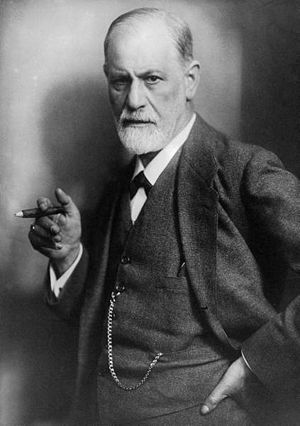
Is it paranoia when you know there are most likely people spying on you? Sigmund Freud (image: Wikipedia)
Over the weekend I read a fascinating profile of WikiLeaks.org founder Julian Assange in a recent TIME magazine. (It’s available online at TIME here.)
Here’s a bit that struck me (emphasis mine):
Assange has retained a hacker’s mentality. He works from secret bunkers on major leaks and is convinced he is under surveillance from government intelligence agencies that tail him when he travels. There’s a touch of paranoia in his style, but say this for Assange: he takes his work seriously. In discussion with TIME, he offers lengthy and reasoned arguments about U.S. jurisprudence and the importance of the First Amendment.
It’s a paradox. While Assange might like to pummel the U.S. for its performance in Afghanistan, he also understands that his work is founded on principles of which the U.S. and its Western allies remain important protectors. “We must make the default assumption that each individual has the right to communicate knowledge to other individuals,” Assange says of his decision to publish the Afghanistan papers. “And the U.S. First Amendment is clear that publishers have the right to tell the people what is going on.”
The combination of ‘a hacker’s mentality’, ‘a touch of paranoia’ and a firm belief in free speech and the right of individuals and publishers to expose political and other machinatiions reminded me of a clichéd image of the Japanese: Intensely curious about others, but intensely private.
I think the chances of Assange and his associates being under surveillance are extremely high — there’s surely almost no doubt about it, given his profile and the bloody nose WikiLeaks has given security agencies in the US and elsewhere. (So is he paranoid?)
Interesting (well, to me anyway) that the conversation about First Amendment rights should pop up just as we’ve been looking at the rights to religious freedom guaranteed (in the US) by that same amended Constitution.
WikiLeaks — to be trusted or not?
I’ve yet to reach a real conclusion on WikiLeaks.org.
I like a lot of what they do, they’re clearly zealots (which are always regarded as a double-edged sword, in my own experience). But when I read that Assange had edited the (now famous) leaked footage of the US helicopter gunship attack which killed two Reuters staff so that images of someone holding a RPG grenade launcher didn’t appear, I caught a whiff of manipulation and (we’ve discussed this before) bending reality.
Propaganda that way lies.
Leave aside the judgment implicit in his title: ‘Collateral Murder’. Journalists are entitled to hold a point of view — and truthfully, I’m more comfortable when they express it rather than try to dress up in false ‘objectivity’ clothes.
These WikiLeaks guys need to be purer than Caesar’s wife, absolutely straight in their reporting — NOT spin doctors, however noble their intention.
As the famous quote attributed to Daniel Patrick Moynihan states:
Everyone is entitled to his own opinion, but not his own facts.
At least state the facts to the best of your knowledge, Julian. (Ahem.)
Cutting and splicing the footage to suit your own argument is a job you should leave to Oliver Stone or Michael Moore.


[…] targeting whistle-blower Julian Assange on the BBC … crikey! Remember TIME magazine’s little put-down about his mental state? Paranoid? Oh really? 'A pathetic attempt to smear' … (click to […]
[…] At one point Keller describes Wikileaks as “a secretive cadre of antisecrecy vigilantes”… doh, Bill, who’s being ‘credulous’ now? What do you expect? Of course they’re secretive! Just like journalists hunting a story or working up confirming sources. Add to that the very real aspect of the ‘intelligence’ manhunt/vendetta against Assange, and yeah, I think they have every right to be ‘secretive’ … or even ‘paranoid’ as we discussed here earlier? […]
[…] Remember Assange being described as a ‘lothario‘ and ‘paranoid‘. […]
[…] Worth reading. Pilger points to the repeated smear of Assange as “paranoid” — which was an early theme I picked up long ago, too, I recall. See Paranoid (?) but a whistleblower […]